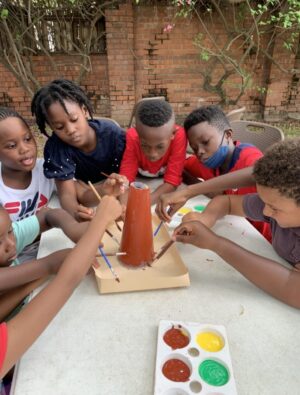Designated spaces and programmes like playgrounds, parks and children’s events and summer camps are essential to the quality of life for children and families. With a population of over 4 million, [where 31percent are ages 0-14 years old], Accra has a shortage of spaces and programmes that centre the cognitive and physical growth of children.
Though the topic is pressing and the deficit is a call to action for both public and private sector stakeholders, individuals like Asha Bello are chipping away at the issue by creating child-centred solutions for Ghana.
 Child development is a global concern as it pertains to planning the future of a country. One crucial part is city planning with children in mind. Ghana has had an influx of real estate development over the past five years, but as with most emerging markets, developing open spaces with children in mind often gets neglected.
Child development is a global concern as it pertains to planning the future of a country. One crucial part is city planning with children in mind. Ghana has had an influx of real estate development over the past five years, but as with most emerging markets, developing open spaces with children in mind often gets neglected.
Playgrounds in particular has been specially recognized under Sustainable Development Goals (SDGs) 11 which partially states that “By 2030, provide universal access to safe, inclusive and accessible, green and public spaces, in particular for women and children, older persons and persons with disabilities.”
The United Nations Convention on the Rights of the Child (UNCRC) the African Charter on the Rights and Welfare of the Child (ACRWC) recognizes that every child has a right to rest and leisure, to engage in play and recreational activities appropriate to the age of the child and to participate freely in cultural life and the arts.
Asha, a Child Development Specialist and CEO of The Cheeky Monkey Club, shared “There’s so much more we can do for children in Ghana, at all levels” and cautioned that taking for granted the role of designated spaces and programmes for play in Ghana could inhibit the potential and cognitive development of children.
Her comment corroborates similar concerns raised by the Ghana Education Service Chairman over the lack of playgrounds in schools, particularly private institutions. In 2019, The GES Council had threatened to sanction schools without playgrounds on the basis that they were a key requirement in setting up schools and they play a key role in the holistic development of children.
According to Cheeky Monkey Club Director Asha, all is not lost, as the private sector could also enter the space and fill the gap. She assists schools in Ghana to design and develop playgrounds. Most of these spaces have been designed with the SDGs requirements in mind, which includes safety, leisure and opportunity for children to play as they learn.
Mrs. Bello, who runs The Cheeky Monkey Club, a space dedicated to child development through learning and playing and other alternative education program, believes that children need a break from the routine academic calendar.
The Cheeky Monkey Club which has recently moved to a bigger space is equipped to expose children to activities that centre Science, Technology, Engineering and Mathematics (STEM), coding, team building, body and brain coordination and improved flexibility and balance. The space also supports children to develop motor skills, hand-eye coordination, improved instincts, healthy heart and lung function, stronger muscles and lowered risk of obesity.
These benefits are woven into activities during an annual summer school programme to give children a break and learn new things as they play. During the long vacation from July and August, parents have an opportunity to enroll their children in the MindCraft Summer Programme starting from July 4 to August 26, 2022. Such programmes support children with holistic development as they learn through play and are exposed to physical activities and career paths.
According to her, it is necessary for schools, communities, public spaces and homes to make it a point to create enriching content for children. This, according to her, is a sure way of ensuring children develop holistically for both today and the future. The Cheeky Monkey will host the MindCraft Summer Camp and a Children’s Entrepreneurship Fair in September 2022.










